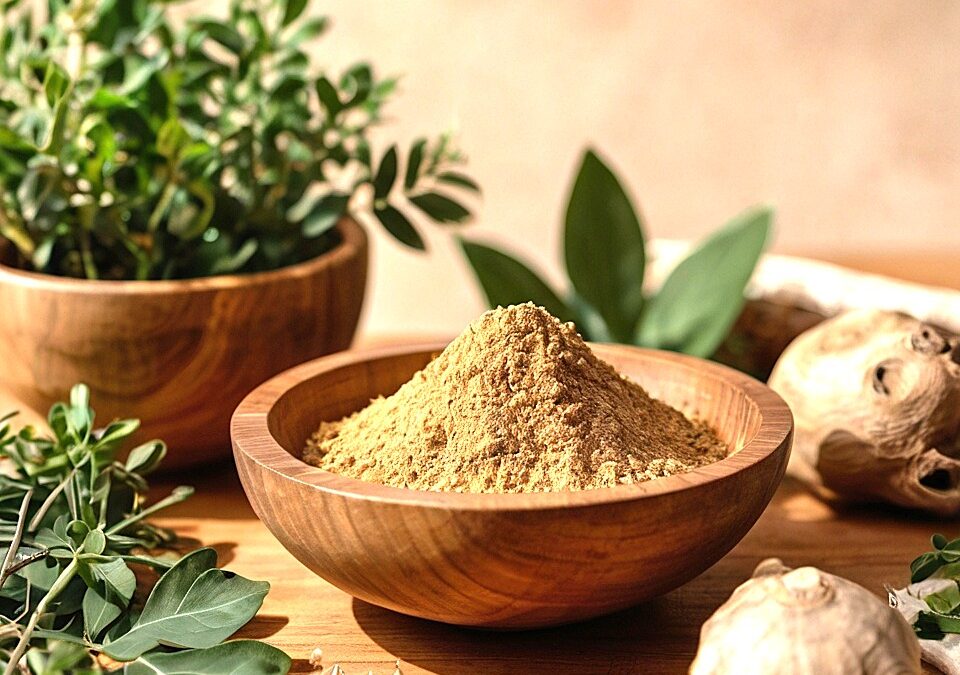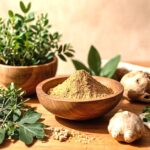Introduction
Maca root (Lepidium meyenii) has been used for thousands of years in traditional Peruvian medicine. Known as “Peruvian ginseng,” maca is prized for its ability to support hormonal balance, energy levels, fertility, and sexual wellbeing. For women experiencing menstrual irregularities, low libido, perimenopause symptoms, or stress-related fatigue, maca can be a gentle, natural tool to restore equilibrium.
At Holistic Gynaecology Clinic London, we often discuss maca as part of a personalised, lifestyle-based approach to female hormonal health. This article explores how maca works, what benefits the research shows, and how women can use it safely to support long-term wellness.
1. Maca and Hormonal Balance
Unlike herbs that contain plant hormones (phytoestrogens), maca works on the hypothalamic–pituitary–ovarian (HPO) axis, the body’s main hormonal command centre. This makes maca an adaptogen: it helps the body rebalance itself rather than forcing a specific direction.
Benefits for women may include:
- More stable menstrual cycles
- Reduction in PMS symptoms, including mood swings and low energy
- Support during perimenopause, easing hot flashes and irritability
- Improved stress response, which positively affects hormone production
Studies suggest maca can reduce feelings of anxiety and enhance wellbeing, which often contributes to improved cycle regularity.
2. Maca for Enhancing Female Libido
One of the best-known benefits of maca is its effect on libido and sexual desire. Research shows that maca can help women who experience low libido due to:
- stress
- fatigue
- perimenopause
- previous negative experiences with hormonal contraception
- psychological tension or low mood
Unlike synthetic medications, maca supports sexuality by improving energy, emotional balance, and hormonal communication, rather than acting as a stimulant.
Reported benefits include:
- Stronger sexual desire
- Enhanced arousal and vaginal lubrication
- Improved satisfaction and intimacy
For many women in midlife, it offers a natural alternative before considering hormone-based treatments.
3. Maca for Fertility and Reproductive Health
Although more research is needed, maca has traditionally been used to:
- support reproductive function
- increase cervical mucus quality
- promote healthy ovulation
Its dense nutritional profile (rich in amino acids, iron, iodine, and B vitamins) also supports the body during preconception.
4. Types of Maca and How to Choose
Maca comes in several varieties; each has unique strengths:
- Yellow maca – most widely used; excellent for energy and daily balance
- Red maca – best researched for women’s pelvic health; may support endometrial and hormonal stability
- Black maca – often used for mood support, memory, and libido
At Holistic Gynaecology Clinic London, red and yellow maca blends are often recommended for women seeking better hormonal balance.
5. How to Use Maca Safely
Recommended dosage
Most research supports a range of 1.5–3g per day (around ½–1 teaspoon of powder or 1–3 capsules daily).
Best time to take it
- In the morning for energy
- With food to avoid digestive discomfort
- Consistently for 6–12 weeks for optimal results
Who should avoid maca?
- women with uncontrolled thyroid conditions (due to natural iodine)
- anyone with hormone-sensitive cancers (consult a specialist first)
Always choose gelatinised maca, which is easier to digest and absorbs better than raw maca powder.
Conclusion
Maca is a powerful natural ally for women experiencing hormonal imbalance, low libido, perimenopause symptoms, or cycle irregularities. When used thoughtfully and consistently, it can enhance vitality, emotional wellbeing, sexual confidence, and overall gynaecological health.
For personalised guidance on maca and hormonal support, the team at Holistic Gynaecology Clinic London is here to help.
Bibliography
- Gonzales, G. F. (2012). Ethnobiology and ethnopharmacology of Lepidium meyenii (Maca), a plant from the Peruvian Highlands. Evidence-Based Complementary and Alternative Medicine.
- Brooks, N. A. et al. (2008). Beneficial effects of Lepidium meyenii (Maca) on psychological symptoms and sexual function in postmenopausal women. Menopause.
- Stone, M. et al. (2009). Maca root: medicinal and nutritional properties. International Journal of Biomedical Science.
- Rubio, J., Yucra, S., Gasco, M., & Gonzales, G. F. (2011). Dose–response of black maca (Lepidium meyenii) in mice. Andrologia.





